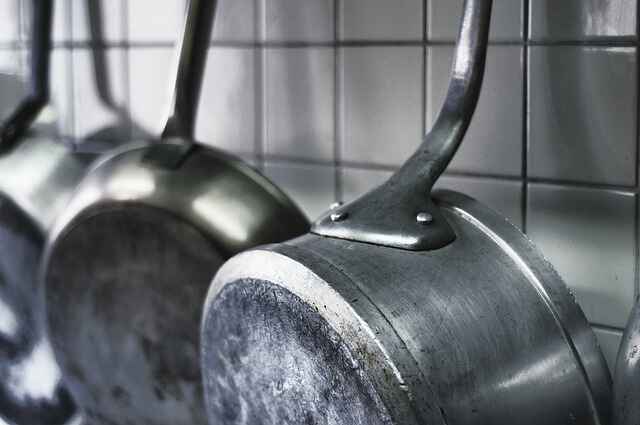Have you ever thought about how the cooking pot you use can affect the quality of your food? Several metals not only deplete important minerals from food but also render them poisonous. Aluminium is one of them. Aluminium cookware may appear quite enticing while you cook or serve, but as they say, “All that glitters is not gold,” therefore you should think twice before buying any! Cooking in such utensils is not advised because aluminium heats up quickly and reacts easily with acidic foods and vegetables. These chemical reactions have an impact on your immune system. Come, let’s check out the health side effects of Aluminium Utensils
Also, Read Top 5 Health Problems in Women After 40!
Why You Should Not Cook and Eat In Aluminium Utensils
Many of us use aluminium in our daily lives to cook with, drink water from aluminium bottles, and wrap food in aluminium foil. We use this metal daily. Numerous studies have highlighted the fact that using aluminium cookware in daily life might put our lives in danger. Besides, although aluminium is a naturally occurring element found in the environment, it is not considered an essential mineral for human health

The Health Side Effects of Aluminium Utensils: Reasons Why Aluminium Utensils are Considered Risky:
Aluminium leaching: Aluminium utensils have the potential to release small quantities of aluminium into food when they are used to prepare acidic or salty foods. Tomatoes and citrus fruits are acidic foods that can hasten this process. Cooking time, temperature, and the state of the utensil’s surface are all factors that affect how much aluminium leaches into the food.
Toxic metals, especially “heavy metals,” are metals and metal compounds that are harmful to people’s health. Some toxic, semi-metallic elements, including arsenic, aluminium, and selenium, are essential to life in extremely small quantities. But when consumed in greater quantities, they turn toxic. They could accumulate in biological systems and pose a serious risk to one’s health.
Neurological concerns: High amounts of aluminium exposure have been linked to neurological conditions like Alzheimer’s disease, multiple sclerosis, and Parkinson’s Disease (Source). Aluminium and Alzheimer’s disease have a complicated and poorly understood relationship, though. Despite the possibility of an association being raised by some studies, others have not discovered a definite cause-and-effect connection.
Gastrointestinal Disturbances: High levels of aluminium in the stomach can lead to gastrointestinal disturbances such as stomach pain, nausea, vomiting, and diarrhoea. These symptoms may occur due to the irritant effects of aluminium on the digestive system. Prolonged exposure to aluminum can contribute to the development of ulcers and inflammation in the stomach lining. This can cause discomfort, and pain, and potentially lead to more serious conditions if left untreated.
Reduced Nutrient Absorption: Aluminum has the potential to interfere with the absorption of certain nutrients, such as iron and calcium, in the stomach. This can lead to deficiencies in these essential minerals, which may have negative impacts on overall health. Aluminum exposure may interfere with the normal functioning of digestive enzymes in the stomach. These enzymes are responsible for breaking down food and facilitating proper digestion. Disruption of enzyme activity can lead to digestive issues and malabsorption of nutrients.
Other health effects: Other body organs and systems may be impacted by aluminium. Increased aluminium consumption has been linked to kidney, lung, and bone ailments. It’s important to remember, though, that these consequences are more frequently linked to exposure to high quantities of aluminium at work, including in industrial settings.
Sensitivities and allergies: Some people have aluminium sensitivities or allergies, which can cause undesirable reactions when exposed to them. This could result in allergic reactions like skin rashes.
Consider the following precautions to reduce the health risks:
- Avoid using aluminium utensils for cooking acidic or salty foods for extended periods.
- Cook such meals in non-aluminium alternatives such as stainless steel, cast iron, ceramic cookware or glass. These materials are regarded as safer and do not raise the same worries about aluminium leaching.
- If you prefer to use aluminium utensils, make sure they are in good shape and free of scratches or other defects that could cause leaching.
- Never use aluminium foil to cook or store acidic or salty foods.
- Eat a varied and balanced diet, because aluminium exposure from utensils is only one potential source, and overall exposure levels must be evaluated.

It’s crucial to remember that using aluminium utensils properly and by safety requirements can significantly reduce the hazards associated with them. The real health effect may differ based on variables like the person’s overall exposure to aluminium, how frequently aluminium utensils are used, and particular medical problems. Reference
Also, Read All about Volumetric Diet: A Detailed Guide on Volumetric Diet for Beginners!





